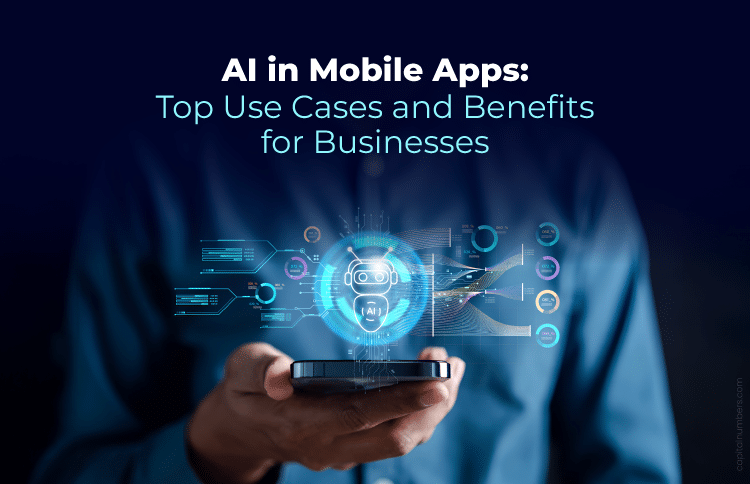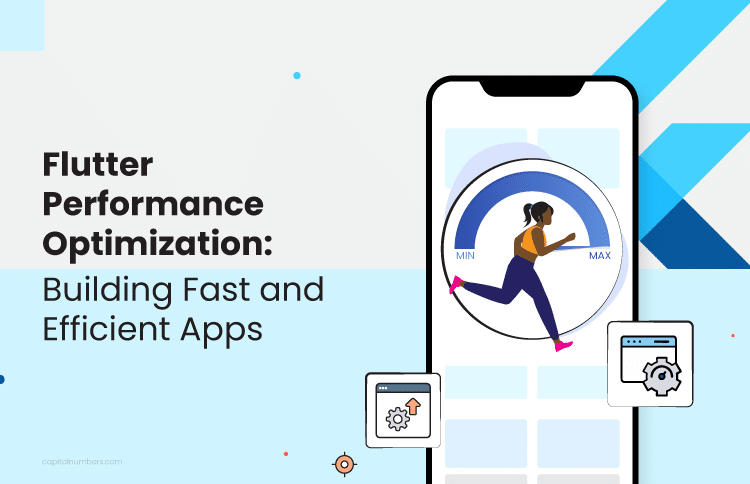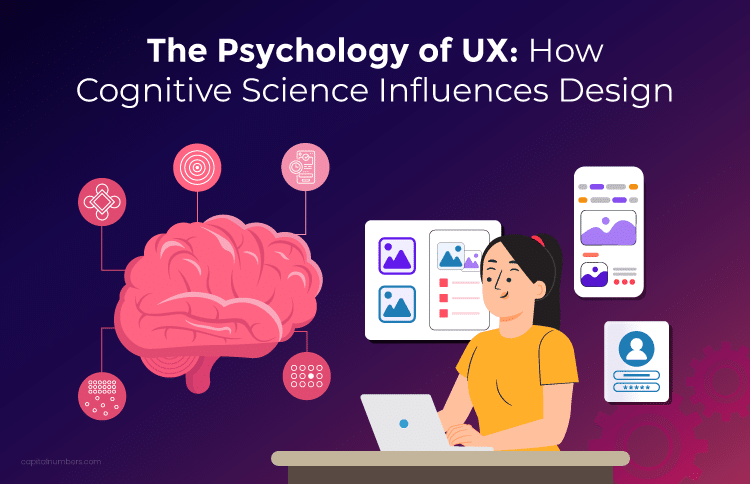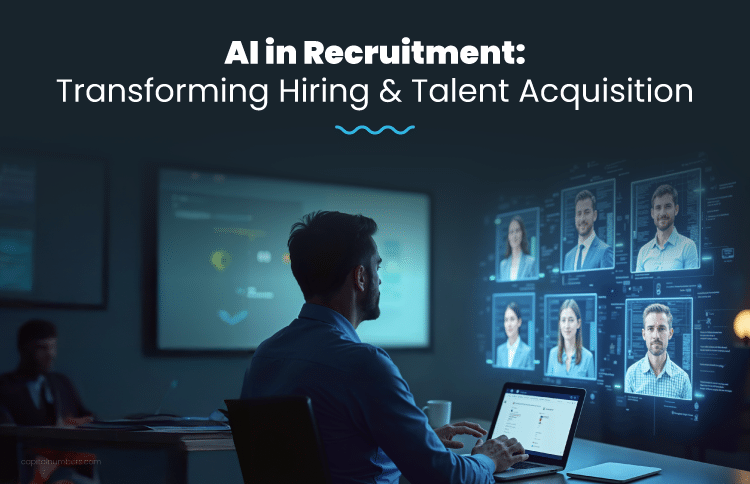AI in Mobile Apps: Top Use Cases and Benefits for Businesses
Table of Contents
Welcome to the world of AI-powered mobile apps, where innovation meets opportunity! Imagine apps that don’t just work but think, learn, and evolve with your users. Sounds exciting, right? That’s the magic of AI development, and it’s transforming mobile app development as we know it.
In this blog, we’ll explore the most exciting use cases and real-world benefits of AI-powered apps. By the end, you’ll see how AI can help your business not just stay in the game but lead it.
Let’s dive in and discover what’s possible when AI meets mobile apps!
How AI is Transforming Mobile App Development
Artificial Intelligence (AI) is transforming how mobile apps are created and used. It’s not just about adding cool features – it’s about making apps smarter, faster, and more user-friendly. Here’s how:
Enhancing App Development Processes and User Experiences
AI helps app developers automate and streamline tasks, making the development process quicker and more efficient. But its real magic lies in improving the user experience. For example:
- AI can analyze user behavior and deliver personalized content, ensuring each user feels like the app was made just for them.
- It powers features like voice recognition, chatbots, and advanced search, making apps more intuitive and easier to use.
Staying Ahead in the Digital Age
Customers now expect apps to anticipate their needs and provide seamless, tailored experiences. Integrating AI into your app:
- Helps your business stand out by offering features that engage users and keep them coming back.
- Future-proofs your app, ensuring it stays relevant as technology and customer expectations evolve.
How Different Industries Are Using AI
- Retail and E-commerce: AI in e-commerce recommends products based on past purchases, boosting sales and enhancing customer satisfaction.
- Healthcare: Apps use AI for symptom analysis and virtual consultations, improving access to medical care.
- Finance: AI-powered fintech helps detect fraud and provides personalized financial advice, ensuring user trust and security.
- Entertainment: Streaming apps like Netflix and Spotify use AI to suggest movies, shows, or songs users are likely to enjoy.
Top Use Cases of AI in Mobile Apps
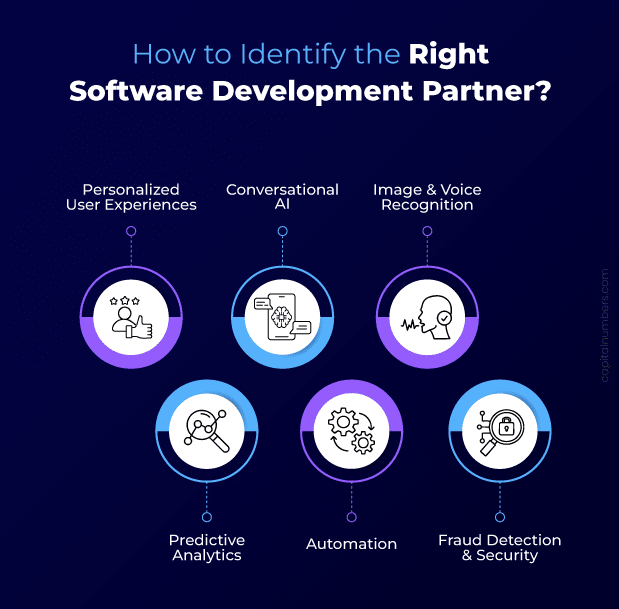
Here are some of the most impactful ways AI is being used in mobile apps:
1. Personalized User Experiences
AI makes apps feel personal and tailored to individual users.
- How it works: AI algorithms analyze user behavior – what they click on, watch, or buy – and then recommend content or products they’re most likely to enjoy.
- Examples:
- Streaming apps like Netflix: Suggesting shows or movies based on the user’s viewing history.
- E-commerce platforms: Recommending products that match a user’s preferences or past purchases.
Business benefits: Personalization keeps users engaged and increases customer satisfaction, which can boost sales and retention.
2. Conversational AI
AI powers chatbots and virtual assistants that provide instant responses to user questions or commands.
- How it works: Conversational AI can handle real-time interactions, answering queries, booking appointments, or even troubleshooting issues.
- Examples:
- Siri and Alexa: Voice assistants that respond to commands and questions.
- Business-specific chatbots: Custom solutions for customer service or internal processes.
Business benefits: These tools save time and resources while improving the customer experience by providing 24/7 support.
3. Advanced Image and Voice Recognition
AI adds intelligence to security and accessibility features in mobile apps.
- How it works: Image recognition can unlock devices or verify identities, while voice recognition enables hands-free commands.
- Examples:
- Security apps: Using facial recognition for authentication.
- Retail apps: Letting users search for products by snapping a photo (e.g., Google Lens).
- Healthcare apps: Supporting voice-enabled interactions for medical advice or data input.
Business benefits: These features enhance security, accessibility, and user convenience, which are critical for industries like healthcare, fintech, and retail.
4. Predictive Analytics
AI helps predict user behavior and optimize app performance.
- How it works: By analyzing data trends, AI can anticipate what users want or need, helping businesses make better decisions.
- Examples:
- Marketing automation apps: Suggesting the best time to send promotions based on user activity.
- Health monitoring apps: Predicting potential health risks based on user data.
Business benefits: Predictive analytics improves decision-making and helps apps provide proactive, rather than reactive, solutions.
5. Automation in Mobile Apps
AI simplifies routine tasks, saving time and effort for users.
- How it works: AI can automate actions like setting reminders, scheduling meetings, or sending notifications.
- Examples:
- Productivity apps: Managing calendars or tasks with minimal input.
- CRM applications: Automating follow-ups or customer interactions.
Business benefits: Automating repetitive tasks improves user satisfaction and boosts productivity.
6. Fraud Detection and Security
AI keeps users and businesses safe from fraudulent activities.
- How it works: AI monitors transactions in real-time to detect suspicious behavior, flagging potential fraud before it causes damage.
- Examples:
- Financial apps: Identifying unusual transaction patterns or login attempts.
- E-commerce platforms: Detecting fake reviews or account takeovers.
Business benefits: Strong security builds trust with users, especially for apps in sensitive industries like finance and e-commerce.
How Global Brands Across Industries are Leading with AI-Driven Applications
1. Fashion: H&M has integrated Artificial Intelligence (AI) into its operations to enhance both supply chain efficiency and customer experience. Through a strategic partnership with Google Cloud, H&M developed an enterprise-wide data platform that leverages AI and machine learning to optimize inventory management and predict fashion trends. This AI-driven approach enables H&M to align production with customer demand, reducing waste and improving sustainability. Additionally, AI-powered applications personalize the shopping experience by analyzing customer preferences and providing tailored product recommendations. (Source: aiexpert.network)
2. Retail: Amazon leverages AI and ML to enhance customer and seller experiences, offering personalized user journeys with tailored interfaces and behavior-based recommendations. AI-generated product videos save sellers time and resources while engaging a video-savvy audience, and regionalized search adapts to linguistic and cultural preferences, simplifying product discovery. The Amazon AI assistant empowers sellers with tools for registration, demand forecasting, and seasonal trend optimization. Additionally, AI streamlines logistics by improving address validation, optimizing packaging, and ensuring faster, more efficient deliveries. (Source: AboutAmazon)
3. Healthcare: Teladoc Health’s recent studies, presented at the American Diabetes Association’s 84th Scientific Sessions, demonstrate the efficacy of their predictive AI modeling in managing type 2 diabetes. By analyzing member data, their AI identifies individuals at risk of uncontrolled diabetes, enabling timely, personalized interventions. This approach has led to a threefold increase in member engagement and an additional 0.4% reduction in A1c levels, improving from 8.2% to 7.8%. Furthermore, personalized content in weekly emails has increased health coach engagement by 50%, underscoring the impact of AI-driven strategies on health outcomes. (Source: TeladocHealth)
4. Fintech: Revolut introduced an advanced AI-driven scam detection feature to safeguard customers from card scams. This system employs machine learning to identify potential scams, intervening by declining suspicious transactions and guiding users through an in-app process to verify the legitimacy of their actions. Since its implementation, Revolut has observed a 30% reduction in fraud losses related to card scams, particularly those involving fraudulent investment opportunities. This AI feature is now available to Revolut customers worldwide, enhancing the platform’s security measures against financial fraud. (Source: Revolut)
Challenges in Implementing AI for App Development
AI-powered mobile apps can bring incredible benefits to your business, but implementing AI comes with its own set of challenges. Here’s what you need to know:
1. Complexity of AI Integration
Developing an AI-powered app is more than just adding a new feature—it requires specialized skills and technical expertise.
AI relies on advanced algorithms, machine learning, and data processing, which means you need experienced developers who are proficient in these technologies.
By partnering with a skilled AI development company, you can ensure the complexities of AI integration are managed seamlessly, allowing you to focus on achieving your business goals.
2. Data Privacy Concerns
AI-powered apps process vast amounts of user data, making privacy and security critical concerns.
Complying with data protection laws such as GDPR or CCPA can be challenging, and mishandling user data may result in legal complications and harm your business’s reputation.
To address these challenges, collaborate with app development companies that prioritize secure data handling and have expertise in creating apps that comply with privacy regulations. Key safeguards include encryption, data anonymization, and implementing strict access controls.
3. Integration with Legacy Systems
If your business depends on older software or systems, integrating AI can present significant challenges.
Legacy systems often lack support for modern AI solutions, resulting in compatibility issues or requiring extensive upgrades.
By leveraging skilled AI development services, you can implement custom solutions that seamlessly bridge the gap between your existing systems and AI-powered tools, ensuring a smooth transition without disrupting your operations.
4. Continuous Algorithm Improvement
AI is not a “set it and forget it” solution—it requires continuous updates and maintenance to remain effective.
As user behavior, data patterns, and technology change over time, AI algorithms must be regularly refined to ensure they continue delivering accurate results.
Working with a mobile app development company that provides long-term support and maintenance services ensures your AI-powered app stays current and aligned with your business growth.
You May Also Read: AI for Business: How to Plan and Prepare for Project Success
Future Trends in AI for Mobile App Development
AI is continuously evolving, opening up new possibilities for mobile apps to be smarter, faster, and more engaging. Here are some exciting trends that are shaping the future of AI in app development:
AI and AR Integration
Combining Artificial Intelligence (AI) with Augmented Reality (AR) to create more immersive and interactive experiences. AI enhances AR by understanding the environment and making real-time adjustments to visuals and interactions.
Examples:
- Gaming: AI-powered AR games that adapt to the player’s environment for a richer experience.
- Retail: Apps that let users see how furniture would look in their room or try on virtual outfits.
- Tourism and Travel: AR travel guides enriched with AI that provide personalized recommendations and historical details.
- Automotive: Virtual showrooms allowing customers to explore car models with AI-driven configuration recommendations.
Advances in Natural Language Processing (NLP)
NLP is the technology behind voice assistants and chatbots, and it’s becoming more advanced every day. With its growing advancements, NLP is unlocking new trends and use cases in app development.
AI-powered NLP enables apps to understand and respond to voice commands or text queries in a more natural and human-like way.
Examples:
- Voice assistants like Siri or Alexa that improve in accuracy and functionality.
- Chatbots that understand complex queries and respond with meaningful solutions.
Better NLP means faster and smoother user interactions, reducing the need for human customer support and improving user satisfaction.
AI-Powered App Maintenance
AI is helping apps stay healthy and efficient by predicting and preventing potential issues.
Predictive maintenance tools powered by AI monitor app performance and identify potential problems before they happen.
Examples:
- Apps that alert businesses to performance bottlenecks or security vulnerabilities.
- Tools that optimize app updates based on user activity and feedback.
Preventing downtime and maintaining app performance ensures a seamless user experience, saving time and money in the long run.
These future trends in AI are shaping the next generation of mobile apps, offering businesses innovative ways to engage users, streamline operations, and stay competitive.
You May Also Read: How to Build a Mobile App That Drives Business Growth
Conclusion
AI is revolutionizing the world of mobile app development, bringing smarter, faster, and more personalized experiences to users while delivering real value to businesses. It’s not just about technology—it’s about transforming the way businesses interact with their customers, streamline operations, and stay ahead of the competition.
From personalized user experiences and advanced analytics to automation and predictive maintenance, AI-powered mobile apps offer countless opportunities to enhance customer satisfaction, reduce costs, and scale effortlessly. Whether you’re in retail, healthcare, finance, or any other industry, the possibilities with AI are boundless.
Now is the time to take your app to the next level. Reach out to expert app developers who can create tailored, AI-powered solutions designed specifically for your business needs.
The future is here – embrace AI and watch your app transform into a powerful tool for growth and success!

